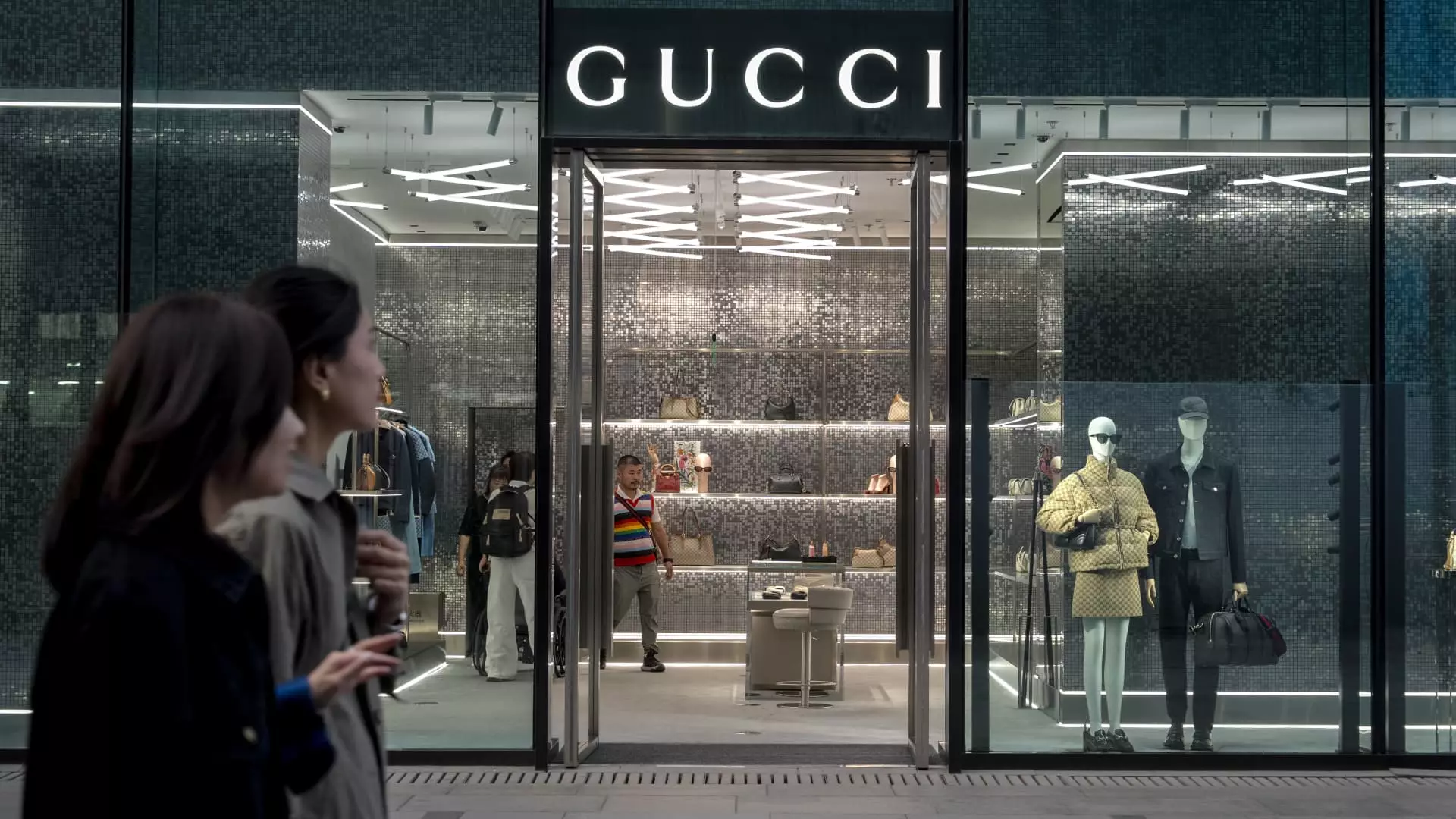The luxury goods market is known for its volatile nature, and Kering, the esteemed French fashion conglomerate, epitomizes the challenges faced by high-end brands amid changing consumer preferences and economic uncertainties. Despite efforts to navigate these tumultuous waters, Kering’s latest financial report reveals that the company’s prominent label, Gucci, has been struggling significantly, reflecting a broader issue within the luxury market.
Kering recently announced its fourth-quarter sales figures, showcasing a 12% decline in revenues compared to the previous year, bringing total earnings down to approximately €4.39 billion ($4.52 billion). This figure marginally surpassed analyst forecasts from LSEG, which predicted revenues would land around €4.29 billion. However, what stands out is Gucci’s performance, which has continued its downward trajectory. The brand, which historically represented the backbone of Kering’s revenue, experienced a staggering decline of 24%, with sales plummeting to €1.92 billion. This stark loss underscores a pivotal shift in consumer spending habits and brand desirability, especially given that Gucci accounts for nearly half of Kering’s overall income.
In terms of the full-year results, Kering recorded a similar 12% dip, consolidating total revenues for 2023 at €17.19 billion, slightly above the anticipated €17.09 billion. Operating income also halved to €2.55 billion, connecting dots to the overall struggles faced throughout the year. This underperformance is particularly concerning for stakeholders and market analysts who had anticipated a more robust return to growth following a series of high-profile initiatives within the luxury sector.
CEO Insights: Navigating a Transformative Landscape
François-Henri Pinault, Kering’s chairman and CEO, attributes the company’s recent performance to a necessary transformation across its various houses. He stated, “[We] accelerated the transformation of several of our Houses and moved determinedly to strengthen the health and desirability of our brands for the long term.” These comments highlight an effort to recalibrate brand strategies amidst declining sales figures, suggesting an injection of new ideas and approaches would be critical for rejuvenation in the luxury market.
While there has been a noted improvement in sales for other brands under Kering’s umbrella, such as Yves Saint Laurent and Bottega Veneta, the lack of specific market details remains a focal point of concern. Investors are keenly aware that although there are pockets of strength, the overarching narrative will likely hinge upon the performance of the beleaguered Gucci brand, which has been a key driver of Kering’s success in the past.
The downturn in luxury spending has been acutely felt within the Chinese market—a critical area of growth for luxury brands worldwide. Kering finds itself particularly exposed to this volatility, as consumer demand shifts in response to broader economic conditions. Recent luxury reports indicate that investors are increasingly wary of the forecast for recovery within this vital demographic as Kering competes with rival groups that have shown varying levels of success in leveraging their offerings to pivot alongside consumer trends.
Investor sentiment remains mixed, as evidenced by the recent underwhelming results from LVMH, another luxury powerhouse. While the market had initially been buoyed by solid performances from rivals like Richemont, the overall narrative surrounding the luxury market appears increasingly fragmented.
Changes Ahead: New Leadership at Gucci
Adding momentum to speculation regarding Gucci’s future trajectory, Kering’s recent announcement regarding the departure of Sabato De Sarno, Gucci’s design chief, adds a layer of complexity to the brand’s ongoing narrative. De Sarno’s brief tenure, marked by a shift towards minimalism, comes on the heels of Alessandro Michele’s more flamboyant designs that previously defined Gucci’s unique appeal.
The impending appointment of a new creative leader has ignited discussions among investors and analysts alike, who view this change as a pivotal moment for the brand. Analysts like Simone Ragazzi of Algebris Investments emphasize that Kering must mark a clear transition for Gucci to reestablish consumer confidence and renew brand allure. The current market is desperately seeking signs of a reset that could align Gucci back with its position as a luxury frontrunner.
As Kering contends with a challenging year ahead, marked by fluctuations in stock price and investor confidence, the focus will inevitably turn to the company’s ability to implement effective change. When analyzing the broader luxury landscape, it becomes evident that while there are hints of recovery, the journey for Kering—and indeed many luxury brands—will require considerable strategizing, innovative thinking, and a keen understanding of consumer behaviors.
The luxury industry may be transient, but Kering’s potential to rebound remains contingent on its adaptability and responsiveness to market signals, especially as it grapples with reshaping Gucci’s brand narrative for an evolving market context. With a common thread of hope and resilience, stakeholders closely monitor what lies ahead for this iconic luxury group.

